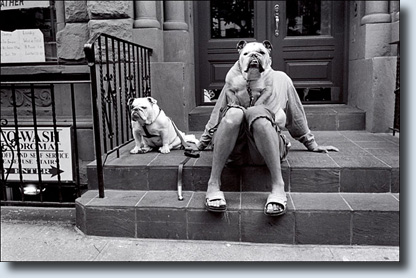
Man Bites Dog
From The New York Times:
Life on a Banana Peel: Elliott Erwitt's View of an Absurd Cosmos
By VICKI GOLDBERG
Published: December 14, 2003
If you need a smile during the holidays, drop in on "Elliott Erwitt: Leica Lifetime Achievement Award 2003," through Jan. 3 at the Leica Gallery on Broadway and Bond Street. Over the years Mr. Erwitt has produced a passel of photographs to smile at (and, for ballast, some to be very serious about). He recently turned 75 and still packs a grin in his camera bag and carries it around. He attended the opening of his 60-work show in a Japanese traffic policeman's vest lighted up brighter than a Christmas tree. He sometimes answers the telephone saying simply "Speaking."
MORE...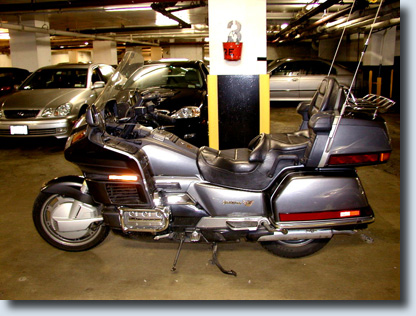
The Original Issue, '88 Gold Wing GL-1500
7:50pm: duncan Performs Cowboys

duncan Rocks the C-Note
On Friday night duncan closed out its four-week stint at New York City's famed C-Note, playing two scintillating sets and offering up a pearl, delivered just after the first break when singer/songwriter Bob Duncan took the stage for solo piano renditions of his great hits Cowboys and Jamie for the first time in several years. If you missed it, we're sorry, Barnes, but it's not our fault. Check Duncan's site, at www.innergroove.com. There are also some preliminary photos for you, click on the photo above. I shot lots of film, so these are just a few; more on the way. Also, here's a link to a couple of Quick Time video clips of two songs from the gig, This One Last Time and, of course, Cowboys. But they are pop up windows, so make sure you're browser's enabled for that, and they are large files (5MB@) so unless you have cable modem or DSL, you might want to sit this one out.
3:00am: Plug it in and watch it work
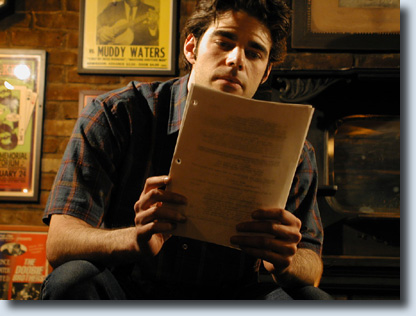
Mike Money performing at PLUG
(Photo Gallery Pending Permissions)
If you were there, you know what it's about.
If not, two words, people: PLUG.
'Nuff said.
11:00am: Bob Duncan Plays the C-Note...
...and several others in a Friday night show at N.Y.C.'s C-Note: Click here for Bob Duncan's InnerGroove Website:
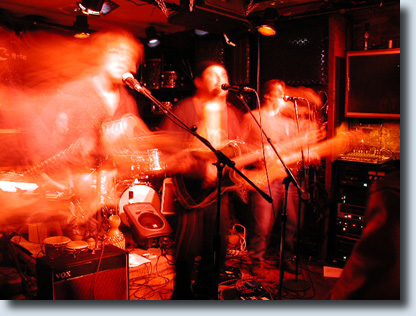
The Spirits of DUNCAN playing the C-Note:
CLICK FOR FULL PHOTO GALLERY
I've got a couple of Quick Time Videos of the gig, clips from two songs: House of Dreams and Overcome, but they're large files, so I'm putting them on a separate page (its a pop-up window). If you've got cable modem or DSL, check it out, make sure to set your browser preferences to accept pop-up windows. (If you're on dial-up access, you may want to sit this one out.)
Folks, if you haven't heard DUNCAN yet, you are missing out. You can find out more about the band, featuring singer/songwriter Bob Duncan, John Putnam on lead, Rob Glick on Bass, Alfredo Hidrovo on drums, and Eva Shampaert on percussion and audience hoots and hollers, every Friday in February (there's only one left, people, that's not my fault), 12 midnight at the C-Note, Ave. C and 10th Street. Do not miss this opportunity to see one of the premier performers in New York. This guy played KEYBOARDS and sang backup vocals in Billy Joel's band, so how good must he be! You will watch, you will listen, you will learn. (That's if you can take your eyes off Eva or your ears off John Putnam's unbelievable lead guitar, either of which is worth the price of admission, which by the way is free.) Tip your bartender, people, and I'm not kidding about that.
3:00pm: The Tree I Planted

Outside My Front Door Today
Here's the tree I planted with the block association around 1983. It was just a sapling, no taller than three feet, and needed a splint to keep it afoot. Now it stands three stories proud, it's branches billowing over my fire escape in springtime, brushing against the railing, like an old friend dropping in to say hello.
That's the firehouse to the left in the background, 44 Engine, and the best group of guys you could meet, living here on the block lo these many years, and saving lives, you know. To the right is the schoolyard, countless generations of teens have run the gauntlet of that yard, busting, finally, up the steps and onto the street, grown, and ready to take on the world. I have seen them all, I and my friend, the tree, right here on the block, outside my window.
I woke this morning to this picture postcard of a day, perfect for Christmas Morning in New York City. Of course, it snowed for us this past Christmas, too; so what shall we call this one, Festivus? Who's got the coat rack; get George in here, it's time to wrestle the old man...
3:52am: This Has Got To Feel Great
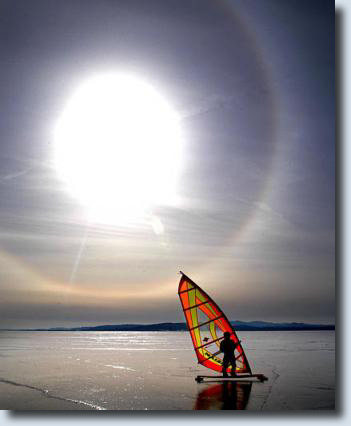
Dave Hansen of Grand Isle, Vt., surfs the ice
of Lake Champlain, near the New York border
"Dave Hansen of Grand Isle, Vt., iceboards below a solar halo on Lake Champlain, Vt., near the Vermont/New York border on Monday, Feb. 3, 2003. The ring around the sun known as a halo is a fairly common weather phenomenon caused by ice crystals in the upper atmosphere. Hanson was iceboarding from Vermont to New York state and back again across the ice on Lake Champlain, which has only frozen over between New York and Vermont once in the last six winters. (AP Photo/Rob Swanson)"
from Yahoo.com
Next Day: The Boys Win Again
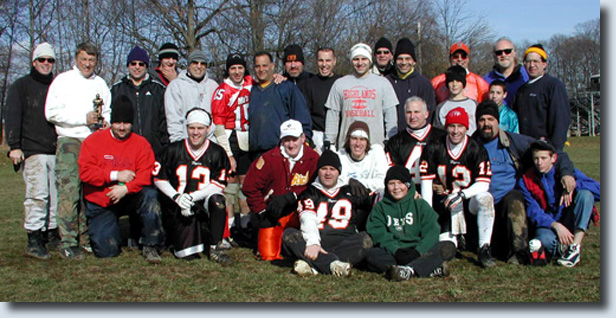
This Year's Photo: Turkey Bowl 2002
Standing: The Victors: The Boys: Joe, Gary Welsh, John Farrell, Todd Aferiat, Rick Umans, G.D. Peters, Larry Malament, Jay Katz, Al Sapienza, Darren DeMarch, George Armston, Bob DeMarch, Brett & Michael Smith, Shadey, Ron Jacaruso.
Kneeling: The Vanquished, The Generals: Big Dude, Elbows, Rick Sarter, Pete, Noel, Son of Pete, Corey, Joe Ruback, Ralph, Son of Ralph.
Another Turkey Bowl, people, with some chilly weather and a hard, near-frozen field, warmed considerably by the surprise cameo appearance of Donald "Mr." Banchik, Vice-Principle at S.V.H.S. when The Boys will be boys were in attendance, and victim and owner of the storied Volkswagon in the hallway illusion, among others. The following members of The Boys were present and accounted for: yours truly G.D. Peters, Ronnie Jacaruso, Rick "Takedown" Umans, Bob "The Iron Jaw" DeMarch, his son and perrenial M.V.P. Darren DeMarch, Michael Smith, and his son and soon-to-be Q.B. and perrenial M.V.P. Brett Smith, Q.B. Larry "I'll-give-you-a-hundred-dollars-for-this-car-if-there's-a-full-tank-of-gas-and-fifty-bucks-in-the-glove-box" Malament, and Q.B. Gary Welsh (although he arrived unfashionably late), John Farrell, Joe Video, Todd Aferiat, Film and Television star Al Sapienza in a welcome cameo appearance between appearances on The Sopranos, "24", and his many feature films, and George Armston in a rare and unsupervised pre-probationary parole hearing house-arrest sabatical, the usual suspects. Notably absent from the lineup this year were Peter "Rasputin" Ciszewski, his first miss in a millenium, and Robert Garbus, his second miss in a row and we are beginning to smell a pattern here, should we call it the Paul Herdemian syndrome?
All the Generals were there, Q.B. Ricky Sarter, Ralph, Pete, Perrenial M.V.P. Joey Ruback, Corey, et al, and it's a good thing they show up every year since no one else would play us. We are further giving thanks to Joey Ruback for his Turkey Bowl spirit, as he brought stolen pylons and yard markers to line the field this year, and had a Turkey Bowl M.V.P. trophy made, which he brought for presentation to our perennial M.V.P., Q.B. Gary Welsh, and he said something about the winner bring is supposed to bring the trophy back the next year for the next guy, but I'm pretty sure that trophy's going up on the mantle and it ain't coming down. Kudos, Joey, thanks from all for the extra Turkey Bowl spirit.
We warmed up and began the game, and the Generals took first possession, going two plays before Darren picked off a long ball and returned it to the 20, going in, and The Boys were in business again--business as usual. Larry took the helm at Q.B., and called an option pitch to G.D., roll right, for a pass to Darren across the field on a deep out. G. took the pitch-out, rolled right, and threw, and Darren out-fought Ricky at the goal line for a nice reception, first and goal for The Boys, going in. Two plays later Larry hit Ronnie all alone on a flag to the left corner: The Boys 1, The Generals 0, and since we need a name for our challengers, we may as well call them the Generals, as through the years they have won the Turkey Bowl as often as the Washington Generals defeated the Harlem Globetrotters, which is to say, "Never Have, Never Will," and this has been our motto lo these many years, in spite of the occasional hiccup here and there, which have been very few and very far between.
After trading possessions, The Boys on the 20 and we moved the ball down the field. On third and long Gary launched a deep post down the middle of the field, where he had G.D. in the endzone and Darren DeMarch on the two yard line. Darren went up amidst a sea of defensive backs while G.D. set up camp in the end zone, hoping for a tipped ball and guess what, folks, Darren got a hand on it and sent a tipped ball in a perfect arc, end over end, special delivery--score. Boys 2, Generals 0. We traded downs again, and then Q.B. Gary Welsh drove us to mid-field and pulled out the Nutcracker: option right. Ronnie goes in motion, the ends crack back, and Gary heads for the sideline, turning upfield for a fifteen yard gain until the safety comes up and then...the pitch, a perfect lateral to Ronnie, trailing him along the sideline, and Ronnie goes fifty yards untouched to the endzone: The Boys 3, Generals 0.
More highlights: A big 1st Down reception by Rick "Takedown" Umans, always reliable when the big catch is needed; a HUGE diving deflection by Bob DeMarch, saving a first down that would have positioned the Generals for a comeback touchdown but was instead thwarted the The Iron Jaw; and Michael Smith on a great, diving interception that sucked the life out of a surging Generals drive and set up our final touchdown drive.
After that the wheels fell off the wagon for the hapless Generals; name-calling and internal dissention that ripped the gut and stripped the shine from what had been a very mediocre team, pitching them further into mediocrity. Now was the time for the final humiliation, as the Boys played their trump card, tapping Q.B. Bret Smith on the helmet and sending him into the fray, a future star: the Left-Handed Gun. Keep an eye on this kid, folks, he looks like Chris Simms at the helm, and I can only hope we get him to sign a letter of intent before the major programs get a look at him at the scouting combines. He called a play, broke the huddle, and strode to the line, calmly reading the coverage. He rolled left and hit Papa Michael with a perfect touchdown pass on a play marred by an ugly interference call in the endzone. We took the play over, and Brett called another play. He strolled to the line, once again reading the defense and barking out signals, stood calmly in the pocket and hit G. with one of the prettiest out-and-ups in the storied history of the Turkey Bowl, a play that will mark with distinction the ascension of an up and coming Quarterback to lead the Boys into the next decade, and beyond. (Of course, by then we may be men, but nobody's sure.)
After that we brought in some nine year-olds to play defense, and the Generals finally scored, but it was too little, too late, and all that was left was the taking of the team picture (above) accomplished with much ado and questionable results by yours truly who, in the absence of our photographic guru Monsieur Suzuki, was pressed into service and happy to oblige.) In all seriousness, it was another great Turkey Bowl, with outstanding performances by Q.B. Ricky Sarter and perennial M.V.P. Joey Ruback in a losing effort, Joey all over the field, catching balls and wreaking havok for The Boys, as usual. The Boys keep winning, but Ricky and Joey keep making it hard, giving us a great game year in and year out, and helping to make The Turkey Bowl the great Thanksgiving Day tradition it has always been and continues to be, 33 years and running, with no end in sight.
'Round Midnite: Veteran's Day
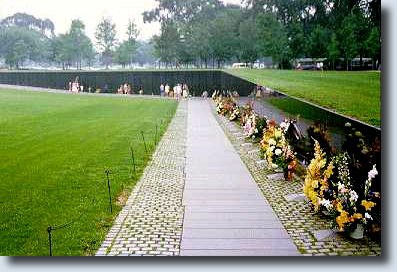
The Vietnam Veterans Memorial, Washington, D.C.
America The Beautiful
by
G.D. Peters
I died, my love, on Veteran's Day
in Nineteen Hundred Sixty-Eight
when purple mountains majesty
above me, towering, called me home
a land mine was my killing mate
it slept as I approached the field
until my step awoke my fate
uniting us in flesh and steel
in unison our parts embraced
our broken fragments glued by blood
the war waged on while I went down
but no one fought where once I stood
how long my flickering flame burned down
each dying breath filled less of me
I saw the field in my home town
where once I climbed the highest tree
and looked below, the streets and homes
stretched o'er the land, both far and wide
I could not see the oceans, though
regardless of how high I climbed
how calm the battleground became
as I lay ripped from limb to lung
no more aligned with one brigade
no longer knowing which side won
amidst a field of flames I lay
guns' spitfire serenading me
I looked, my love, on Veteran's Day
and saw from sea to shining sea
© 2001 G.D. Peters
4:18am: The Stranger

Albert Camus
November 7, 1913: French novelist Albert Camus is born in Algiers
On this day, Albert Camus, future Nobel Prize winner, is born in Algiers to a working-class family.
Camus was a good student and a dedicated athlete who won a scholarship to a prestigious French high school in Algiers. His sporting endeavors were ended at age 17 by an attack of tuberculosis. Instead of pursuing an athletic career, he took a degree at the University of Algiers. He intended to become a philosophy teacher, but another bout of tuberculosis prevented him from taking a position. He became involved with a theater group in Algiers, writing and producing plays, while he also worked as a journalist. At age 25, he moved to France. During World War II, he joined the French Resistance and wrote for a liberal newspaper. He continued political journalism until 1947, while also writing plays, novels, and philosophical essays.
In 1942, his essay "The Myth of Sisyphus" set out the philosophical questions that he would also address in his novels. He analyzed nihilism and the absurdity and futility of human labor given the inevitability of death. Camus argued that man must make his own meaning by enjoying his efforts and struggles, despite their ultimate lack of significance. He continued to explore these themes in his first novel, The Stranger (1942). In his 1947 novel, The Plague, his characters maintain dignity and loyalty in the face of an epidemic in an Algerian town. In his later novels, essays, and plays, he explored the search for moral order. Camus won the Nobel Prize in literature in 1957. In 1960, after accepting a ride from strangers while hitchhiking, Camus was killed in a car wreck at age 46. (From The History Channel)
1:38am: Ode on a Grecian Urn
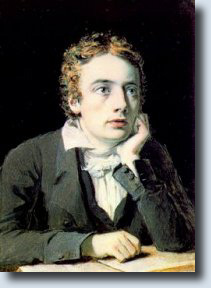
miniature portrait of Keats by Joseph Severn, 1819
ODE ON A GRECIAN URN
1 Thou still unravish'd bride of quietness,
2 Thou foster-child of silence and slow time,
3 Sylvan historian, who canst thus express
4 A flowery tale more sweetly than our rhyme:
5 What leaf-fring'd legend haunts about thy shape
6 Of deities or mortals, or of both,
7 In Tempe or the dales of Arcady?
8 What men or gods are these? What maidens loth?
9 What mad pursuit? What struggle to escape?
10 What pipes and timbrels? What wild ecstasy?
11 Heard melodies are sweet, but those unheard
12 Are sweeter; therefore, ye soft pipes, play on;
13 Not to the sensual ear, but, more endear'd,
14 Pipe to the spirit ditties of no tone:
15 Fair youth, beneath the trees, thou canst not leave
16 Thy song, nor ever can those trees be bare;
17 Bold Lover, never, never canst thou kiss,
18 Though winning near the goal yet, do not grieve;
19 She cannot fade, though thou hast not thy bliss,
20 For ever wilt thou love, and she be fair!
21 Ah, happy, happy boughs! that cannot shed
22 Your leaves, nor ever bid the Spring adieu;
23 And, happy melodist, unwearied,
24 For ever piping songs for ever new;
25 More happy love! more happy, happy love!
26 For ever warm and still to be enjoy'd,
27 For ever panting, and for ever young;
28 All breathing human passion far above,
29 That leaves a heart high-sorrowful and cloy'd,
30 A burning forehead, and a parching tongue.
31 Who are these coming to the sacrifice?
32 To what green altar, O mysterious priest,
33 Lead'st thou that heifer lowing at the skies,
34 And all her silken flanks with garlands drest?
35 What little town by river or sea shore,
36 Or mountain-built with peaceful citadel,
37 Is emptied of this folk, this pious morn?
38 And, little town, thy streets for evermore
39 Will silent be; and not a soul to tell
40 Why thou art desolate, can e'er return.
41 O Attic shape! Fair attitude! with brede
42 Of marble men and maidens overwrought,
43 With forest branches and the trodden weed;
44 Thou, silent form, dost tease us out of thought
45 As doth eternity: Cold Pastoral!
46 When old age shall this generation waste,
47 Thou shalt remain, in midst of other woe
48 Than ours, a friend to man, to whom thou say'st,
49 "Beauty is truth, truth beauty,--that is all
50 Ye know on earth, and all ye need to know."
"John Keats was born in Finsbury Pavement near London on October 31st, 1795. The first son of a stable-keeper, he had a sister and three brothers, one of whom died in infancy. When John was eight years old, his father was killed in an accident. In the same year his mother married again, but little later separated from her husband and took her family to live with her mother. John attended a good school where he became well acquainted with ancient and contemporary literature. In 1810 his mother died of consumption, leaving the children to their grandmother. The old lady put them under the care of two guardians, to whom she made over a respectable amount of money for the benifit of the orphans. Under the authority of the guardians, he was taken from school to an be apprentice to a surgeon. In 1814, before completion of his apprenticeship, John left his master after a quarrel, becoming a hospital student in London. Under the guidance of his friend Cowden Clarke he devoted himself increasingly to literature. In 1814 Keats finally sacrificed his medical ambitions to a literary life.
He soon got acquainted with celebrated artists of his time, like Leigh Hunt, Percy B. Shelley and Benjamin Robert Haydon. In May 1816, Hunt helped him publish his first poem in a magazine. A year later Keats published about thirty poems and sonnets printed in the volume "Poems".
4pm:"O.K." et alia
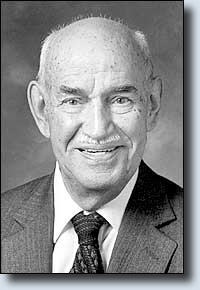
Allen Walker Read in 1988
(From The New York Times)
Allen Read, the Expert of 'O.K.,' Dies at 96
By DOUGLAS MARTIN
Allen Walker Read, a playful prospector of the American tongue who hunted down the source of words like Dixie and Podunk, phrases like the almighty dollar and, most famous of all, those ubiquitous initials, O.K., died on Wednesday at his home in Manhattan. He was 96.
A longtime English professor at Columbia University , he demolished a host of theories about the origin of O.K., an Americanism adopted by virtually every language and one of the first words spoken on the Moon. The original source was not a misspelling by Andrew Jackson or a Choctaw Indian word or a superior brand of Army biscuit or a variety of other possibilities.
Rather, its first known published appearance with its current meaning came in The Boston Morning Post on March 23, 1839: "o.k. — all correct." It appeared at a time when initials, preferably of misspelled words, like "oll korrect," were the fad. "K.Y." meant "no use" ("know yuse"), but that did not catch on.
Mr. Read solved the "O.K." mystery in a series of articles in American Speech in 1963 and 1964, causing "much gnashing of teeth by other etymologists, who had themselves lusted for the laurels of `O.K.,' " according to an article by Michelle Stacey in The New Yorker in 1989.
But Mr. Read did not appreciate having "O.K." overshadow the hundreds of other etymologies he divined. He loved showing how words travel curlicue courses, the mapping of which sheds light on how people think and live. In tracing how the Rocky Mountains came to be called the Rockies, he learned that in 1804 they were the Northern Andes.
His achievements included contributions and commentaries in Funk & Wagnall's, Random House and other dictionaries; being an editor of the Dictionary of American English; and writing the entry on "dictionary" for the Encyclopaedia Britannica.
He wrote scores of research papers and monographs, and his several books included "Milestones in the History of English in America," a collection of essays published this year by the American Dialect Society.
He was a professor of English at Columbia from 1945 to 1974 and was head of many linguistic organizations, including the International Linguistic Association.
Mr. Read saw words as playthings and told The New Yorker that "jubilance is an explanation for a lot of the things that happen in language." He loved and studied slang, euphemisms, pig Latin, double talk, adult baby talk and graffiti. Exuberant, obviously impromptu words like blustrification and discombobulate delighted him.
He once compiled names that natives of Connecticut have called themselves, including Connecticotians, Connecticutensians and Connecticuties, the last reserved for pretty girls.
MORE...2pm: Lights, Music, Action!
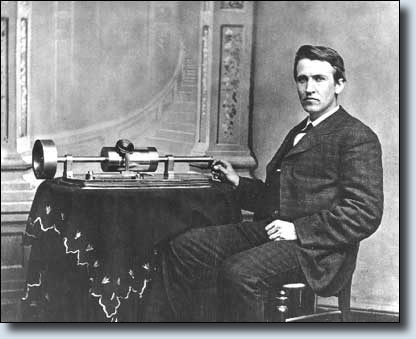
Thomas Alva Edison
OCT. 18, 1931: EDISON DIES
Thomas Alva Edison, one of the most prolific inventors in history, dies in West Orange, New Jersey, at the age of 84.
Born in Milan, Ohio, in 1847, Edison received little formal schooling, which was customary for most Americans at the time. He developed serious hearing problems at an early age, and this disability provided the motivation for many of his inventions. At age 16, he found work as a telegraph operator and soon was devoting much of his energy and natural ingenuity toward improving the telegraph system itself. By 1869, he was pursuing invention full-time and in 1876 moved into a laboratory and machine shop in Menlo Park, New Jersey.
Edison's experiments were guided by his remarkable intuition, but he also took care to employ assistants who provided the mathematical and technical expertise he lacked. At Menlo Park, Edison continued his work on the telegraph, and in 1877 he stumbled on one of his great inventions--the phonograph--while working on a way to record telephone communication. Public demonstrations of the phonograph made the Yankee inventor world famous, and he was dubbed the "Wizard of Menlo Park."
Although the discovery of a way to record and play back sound ensured him a place in the annals of history, it was just the first of several Edison creations that would transform late 19th-century life. Among other notable inventions, Edison and his assistants developed the first practical incandescent lightbulb in 1879, and a forerunner of the movie camera and projector in the late 1880s. In 1887, he opened the world's first industrial research laboratory at West Orange, where he employed dozens of workers to systematically investigate a given subject.
Perhaps his greatest contribution to the modern industrial world came from his work in electricity. He developed a complete electrical distribution system for light and power, set up the world's first power plant in New York City, and invented the alkaline battery, the first electric railroad, and a host of other inventions that laid the basis for the modern electric world. He continued to work into his 80s and acquired 1,093 patents in his lifetime. He died at his home in New Jersey on October 18, 1931. (From The History Channel: This Day In History)
10:44am: Have You Seen Cathay?
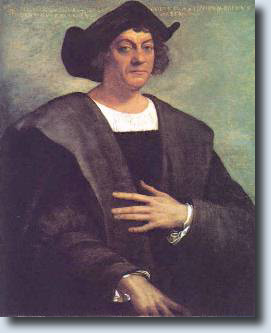
Sebastiano del Piombo painted this portrait
thirteen years after Columbus's death
Click For Columbus Navigation Website
OCTOBER 12, 1492: COLUMBUS REACHES THE NEW WORLD
After sailing across the Atlantic Ocean, Italian explorer Christopher Columbus sights a Bahamian island, believing he has reached East Asia. His expedition went ashore the same day and claimed the land for Isabella and Ferdinand of Spain, who sponsored his attempt to find a western ocean route to China, India, and the fabled gold and spice islands of Asia.
Columbus was born in Genoa, Italy, in 1451. Little is known of his early life, but he worked as a seaman and then a maritime entrepreneur. He became obsessed with the possibility of pioneering a western sea route to Cathay (China), India, and the gold and spice islands of Asia. At the time, Europeans knew no direct sea route to southern Asia, and the route via Egypt and the Red Sea was closed to Europeans by the Ottoman Empire, as were many land routes. Contrary to popular legend, educated Europeans of Columbus' day did believe that the world was round, as argued by St. Isidore in the seventh century. However, Columbus, and most others, underestimated the world's size, calculating that East Asia must lie approximately where North America sits on the globe (they did not yet know that the Pacific Ocean existed).
With only the Atlantic Ocean, he thought, lying between Europe and the riches of the East Indies, Columbus met with King John II of Portugal and tried to persuade him to back his "Enterprise of the Indies," as he called his plan. He was rebuffed and went to Spain, where he was also rejected at least twice by King Ferdinand and Queen Isabella. However, after the Spanish conquest of the Moorish kingdom of Granada in January 1492, the Spanish monarchs, flush with victory, agreed to support his voyage.
On August 3, 1492, Columbus set sail from Palos, Spain, with three small ships, the Santa María, the Pinta, and the Niña. On October 12, the expedition reached land, probably Watling Island in the Bahamas. Later that month, Columbus sighted Cuba, which he thought was mainland China, and in December the expedition landed on Hispaniola, which Columbus thought might be Japan. He established a small colony there with 39 of his men. The explorer returned to Spain with gold, spices, and "Indian" captives in March 1493 and was received with the highest honors by the Spanish court. He was the first European to explore the Americas since the Vikings set up colonies in Greenland and Newfoundland in the 10th century.
During his lifetime, Columbus led a total of four expeditions to the New World, discovering various Caribbean islands, the Gulf of Mexico, and the South and Central American mainlands, but he never accomplished his original goal--a western ocean route to the great cities of Asia. Columbus died in Spain in 1506 without realizing the great scope of what he did achieve: He had discovered for Europe the New World, whose riches over the next century would help make Spain the wealthiest and most powerful nation on earth. (From The History Channel)
'Round Midnite: John Lennon's Birthday

Those of you who know me, know that John Lennon was one of my personal heroes. The night he was shot I hopped in a cab and rode across the Park to the Dakota. I got there before most of the rest of the throng arrived, and tied my bead necklace to the fence, one of the first mementos on what became a memorial wall. I spent the all-night vigil at the front of the barricades (I am readily visible in the archived news footage they show every few years on the anniversary of his death). I sang "Give Peace A Chance" from the time we learned he'd died until the first newspapers arrived on the scene, announcing in bold headlines what we already knew. I somehow anticipated the cheer that went up from the crowd when the papers were held aloft, and still remember the sickening feeling I experienced, hearing these people cheer. Of course, they were not cheering that Lennon was dead, it was a nervous laughter of a cheer, acknowledging that the news media had taken our pictures and put them on the front page with the headlines. Still, it sickened me. I spent the entire night there, and left at 7am, came back to my apartment and wrote a song for John Lennon, called "The Way Things Go." It was a harrowing night and morning, one I will never forget.
Here is a tribute from "Those Were The Days:"
"John Winston Lennon -- composer; musician; one fourth of the famed rock group, The Beatles; husband of Yoko Ono; father of Julian and Sean -- was born on this day in 1940 in Liverpool, England. It’s hard to imagine what the world would be like without his influence on music.
There is hardly a soul anywhere in the world who isn’t familiar with the songs he wrote as half of the team of Lennon and McCartney. When The Beatles were no longer touring, John Lennon collaborated with Yoko Ono in avant- garde works. He then began to express his political views through his music, and in some cases, his actions. Live Peace in Toronto was his first gesture for world peace. And, he returned the coveted Order of the British Empire award (the MBE) to protest British involvement in the Nigerian Civil War. He continued his quest for peace in Give Peace a Chance and with his bed-in for peace at the Amsterdam Hilton following his marriage to Yoko Ono.
His music traced his lifestyles, his views, his childhood, his pain, and jubilation: Cold Turkey, Instant Karma, Mother, Working Class Hero, Jealous Guy, Crippled Inside and How Do You Sleep. Imagine, from the LP of the same title, became his best known work. It also made a statement, paying homage to nonmaterialism. Then there was the LP, Sometime in New York City, filled with anti-establishment verses. Mind Games and Walls and Bridges followed.
Whatever Gets You Through the Night was cause for celebration. It was his first solo #1 hit in the U.S. Lennon then recorded an LP with Yoko, each alternating songs on Double Fantasy. He celebrated his son Sean with Beautiful Boy, his wife with Woman and his new life with both in Just like Starting Over.
He had barely begun to start over when, on December 8, 1980, John Lennon was shot to death outside his New York City apartment building.
It’s hard to Imagine ..."
(From 440 International, Those Were The Days)